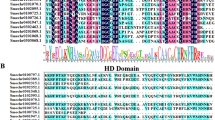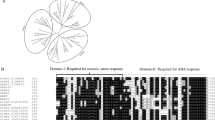Abstract
Aims
R2R3-type MYB transcription factors are associated with diverse developmental processes and responses to abiotic stresses. However, there is limited information regarding drought-responsive R2R3-MYB in a widespread subtropical tree species, Schima superba. Hence, the purpose of this study was to identify and functionally characterize the role of SsMYB113 in S. superba under drought stress.
Results
SsMYB113, a novel R2R3-MYB transcription factor that was targeted to the nucleus in Arabidopsis thaliana protoplasts, functioned as a transcriptional activator during in vitro and in vivo assays. SsMYB113 transcript was abundant in the leaves of six-month-old S. superba, and was significantly up-regulated by PEG-simulated drought stress and abscisic acid (ABA). Overexpression of SsMYB113 in A. thaliana seedlings led to enhanced tolerance to drought stress and facilitated flavonoid biosynthesis and ABA accumulation, including of corresponding biosynthetic genes, particularly SsCHS and SsNCED. Furthermore, SsMYB113 was shown to bind directly to the promoters of SsCHS and SsNCED using Y1H and a dual-LUC assay, thus activating their expression. In addition, in SsMYB113-overexpressing lines, proline, water content, superoxide dismutase, and peroxidase activities increased, while malondialdehyde, electrolyte leakage, and the rate of superoxide production decreased, suggesting the explicit role of SsMYB113 in conferring drought tolerance.
Conclusions
Drought-responsive SsMYB113 functioned as a positive regulator by participating in flavonoid and ABA biosynthesis, thereby enhancing drought stress tolerance in indigenous fast-growing S. superba.










Similar content being viewed by others
References
Agati G, Azzarello E, Pollastri S, Tattini M (2012) Flavonoids as antioxidants in plants: location and functional significance. Plant Sci 196:67–76. https://doi.org/10.1016/j.plantsci.2012.07.014
Baek W, Lim CW, Lee SC (2018) A DEAD-box RNA helicase, RH8, is critical for regulation of ABA signalling and the drought stress response via inhibition of PP2CA activity. Plant Cell Environ 41:1593–1604. https://doi.org/10.1111/pce.13200
Baldoni E, Genga A, Cominelli E (2015) Plant MYB transcription factors: their role in drought response mechanisms. Int J Mol Sci 16:15811–15851. https://doi.org/10.3390/ijms160715811
Bharath P, Gahir S, Raghavendra AS (2021) Abscisic acid-induced stomatal closure: an important component of plant defense against abiotic and biotic stress. Front Plant Sci 12:615114. https://doi.org/10.3389/fpls.2021.615114
Butelli E, Licciardello C, Zhang Y, Liu JJ, Mackay S, Bailey P, Reforgiato-Recupero G, Martin C (2012) Retrotransposons control fruit-specific, cold-dependent accumulation of anthocyanins in blood oranges. Plant Cell 24:1242–1255. https://doi.org/10.1105/tpc.111.095232
Chen CJ, Chen H, Zhang Y, Thomas HR, Frank MH, He YH, Xia R (2020) TBtools: an integrative toolkit developed for interactive analyses of big biological data. Mol Plant 13:1194–1202. https://doi.org/10.1016/j.molp.2020.06.009
Chiu LW, Li L (2012) Characterization of the regulatory network of BoMYB2 in controlling anthocyanin biosynthesis in purple cauliflower. Planta 236:1153–1164. https://doi.org/10.1007/s00425-012-1665-3
Choudhury FK, Rivero RM, Blumwald E, Mittler R (2017) Reactive oxygen species, abiotic stress and stress combination. Plant J 90:856–867. https://doi.org/10.1111/tpj.13299
Clough SJ, Bent AF (1998) Floral dip: a simplified method for Agrobacterium-mediated transformation of Arabidopsis thaliana. Plant J 16:735–743. https://doi.org/10.1046/j.1365-313x.1998.00343.x
Dubos C, Stracke R, Grotewold E, Weisshaar B, Martin C, Lepiniec L (2010) MYB transcription factors in Arabidopsis. Trends Plant Sci 15:573–581. https://doi.org/10.1016/j.tplants.2010.06.005
Fang Q, Wang XQ, Wang HY, Tang XW, Liu C, Yin H, Ye SL, Jiang YZ, Duan YJ, Luo KM (2020) The poplar R2R3 MYB transcription factor PtrMYB94 coordinates with abscisic acid signaling to improve drought tolerance in plants. Tree Physiol 40:46–59. https://doi.org/10.1093/treephys/tpz113
Gonzalez A, Zhao M, Leavitt JM, Lloyd AM (2008) Regulation of the anthocyanin biosynthetic pathway by the TTG1/bHLH/MYB transcriptional complex in Arabidopsis seedlings. Plant J 53:814–827. https://doi.org/10.1111/j.1365-313X.2007.03373.x
Guo JR, Sun BX, He HR, Zhang YF, Tian HY, Wang BS (2021) Current understanding of bHLH transcription factors in plant abiotic stress tolerance. Int J Mol Sci 22:4921. https://doi.org/10.3390/ijms22094921
Gupta A, Rico-Medina A, Caño-Delgado AI (2020) The physiology of plant responses to drought. Science 368:266–269. https://doi.org/10.1126/science.aaz7614
Han BC, Wei W, Mi XC, Ma KP (2016) De novo sequencing and comparative analysis of Schima superba seedlings to explore the response to drought stress. PLoS ONE 11:e0166975. https://doi.org/10.1371/journal.pone.0166975
Hichri I, Barrieu F, Bogs J, Kappel C, Delrot S, Lauvergeat V (2011) Recent advances in the transcriptional regulation of the flavonoid biosynthetic pathway. J Exp Bot 62:2465–2483. https://doi.org/10.1093/jxb/erq442
Hu XS, Hong W, Wu CZ, Hong T, Fan HL, Song P (2007) Analysis of the life table of natural population of Schima superba. Guihaia 27:469–474. https://doi.org/10.1016/S1872-2075(07)60055-7
Jiang JJ, Ma SH, Ye NH, Jiang M, Cao JS, Zhang JH (2017) WRKY transcription factors in plant responses to stresses. J Integr Plant Biol 59:86–101. https://doi.org/10.1111/jipb.12513
Li L, Chen JH, Ren HB, Mi XC, Yu MJ, Yang B (2010) Spatial patterns of Castanopsis eyrei and Schima superba in mid-subtropical broad-leaved evergreen forest in Gutianshan National Reserve. China Chin J Plant Ecol 34:241–252. https://doi.org/10.3773/j.issn.1005-264x.2010.03.001
Li C, Ng CKY, Fan LM (2015) MYB transcription factors, active players in abiotic stress signaling. Environ Exp Bot 114:80–91. https://doi.org/10.1016/j.envexpbot.2014.06.014
Li XR, Tang Y, Li HL, Luo W, Zhou CJ, Zhang LX, Lv JY (2020) A wheat R2R3 MYB gene TaMpc1-D4 negatively regulates drought tolerance in transgenic Arabidopsis and wheat. Plant Sci 299:110613. https://doi.org/10.1016/j.plantsci.2020.110613
Li ZY, Dai PF, Wang YH, Li T, Webb AA, Wang YH, Li ZH, Kou TJ, Shi GA, Zhang BC (2016) Effects of liming on health and growth of young Schima superba trees under canopy of a Pinus massoniana stand damaged by soil acidification in Chongqing, China. New for 47:801–813. https://doi.org/10.1007/s11056-016-9545-5
Li Z, Peng R, Yao Q (2021) SlMYB14 promotes flavonoids accumulation and confers higher tolerance to 2,4,6-trichlorophenol in tomato. Plant Sci 303:110796. https://doi.org/10.1016/j.plantsci.2020.110796
Licausi F, Ohme-Takagi M, Perata P (2013) APETALA2/Ethylene Responsive Factor (AP2/ERF) transcription factors: mediators of stress responses and developmental programs. New Phytol 199:639–649. https://doi.org/10.1111/nph.12291
Liu YH, Wang KL, Espley RV, Wang L, Yang HY, Yu B, Dare A, Varkonyi-Gasic E, Wang J, Zhang JL, Wang D, Allan AC (2016) Functional diversification of the potato R2R3 MYB anthocyanin activators AN1, MYBA1, and MYB113 and their interaction with basic helix-loop-helix cofactors. J Exp Bot 67:2159–2176. https://doi.org/10.1093/jxb/erw014
Livak KJ, Schmittgen TD (2001) Analysis of relative gene expression data using real-time quantitative PCR and the 2−ΔΔCT method. Methods 25:402–408. https://doi.org/10.1006/meth.2001.1262
Per TS, Khan NA, Reddy PS, Masood A, Hasanuzzaman M, Khan MIR, Anjum NA (2017) Approaches in modulating proline metabolism in plants for salt and drought stress tolerance: phytohormones, mineral nutrients and transgenics. Plant Physiol Biochem 115:126–140. https://doi.org/10.1016/j.plaphy.2017.03.018
Millard PS, Kragelund BB, Burow M (2019) R2R3 MYB transcription factors - functions outside the DNA-binding domain. Trends Plant Sci 24:934–946. https://doi.org/10.1016/j.tplants.2019.07.003
Mittler R (2002) Oxidative stress, antioxidants and stress tolerance. Trends Plant Sci 7:405–410. https://doi.org/10.1016/s1360-1385(02)02312-9
Murashige T, Skoog F (1962) A revised medium for rapid growth and bio assays with tobacco tissue cultures. Physiol Plantarum 15:473–497. https://doi.org/10.1111/j.1399-3054.1962.tb08052.x
Nakabayashi R, Saito K (2015) Integrated metabolomics for abiotic stress responses in plants. Curr Opin Plant Biol 24:10–16. https://doi.org/10.1016/j.pbi.2015.01.003
Pourcel L, Irani NG, Koo AJ, Bohorquez-Restrepo A, Howe GA, Grotewold E (2013) A chemical complementation approach reveals genes and interactions of flavonoids with other pathways. Plant J 74:383–397. https://doi.org/10.1111/tpj.12129
Puranik S, Sahu PP, Srivastava PS, Prasad M (2012) NAC proteins: regulation and role in stress tolerance. Trends Plant Sci 17:369–381. https://doi.org/10.1016/j.tplants.2012.02.004
Qi J, Song CP, Wang B, Zhou J, Kangasjärvi J, Zhu JK, Gong Z (2018) Reactive oxygen species signaling and stomatal movement in plant responses to drought stress and pathogen attack. J Integr Plant Biol 60:805–826. https://doi.org/10.1111/jipb.12654
Shokat S, Großkinsky DK, Liu F (2021) Impact of elevated CO2 on two contrasting wheat genotypes exposed to intermediate drought stress at anthesis. J Agron Crop Sci 207:20–33. https://doi.org/10.1111/jac.12442
Stracke R, Werber M, Weisshaar B (2001) The R2R3-MYB gene family in Arabidopsis thaliana. Curr Opin Plant Biol 4:447–456. https://doi.org/10.1016/s1369-5266(00)00199-0
Tang D, Wei F, Qin S, Khan A, Kashif MH, Zhou R (2019) Polyethylene glycol induced drought stress strongly influences seed germination, root morphology and cytoplasm of different kenaf genotypes. Ind Crop Prod 137:180–186. https://doi.org/10.1016/j.indcrop.2019.01.019
Verslues PE, Sharma S (2010) Proline metabolism and its implications for plant-environment interaction. Arabidopsis Book 8:e0140. https://doi.org/10.1199/tab.0140
Wang FB, Kong WL, Wong G, Fu LF, Peng RH, Li ZJ, Yao QH (2016) AtMYB12 regulates flavonoids accumulation and abiotic stress tolerance in transgenic Arabidopsis thaliana. Mol Genet Genomics 291:1545–1559. https://doi.org/10.1007/s00438-016-1203-2
Wasilewska A, Vlad F, Sirichandra C, Redko Y, Jammes F, Valon C, Frei dit Frey N, Leung J (2008) An update on abscisic acid signaling in plants and more. Mol Plant 1:198–217. https://doi.org/10.1093/mp/ssm022
Xiong L, Wang RG, Mao G, Koczan JM (2006) Identification of drought tolerance determinants by genetic analysis of root response to drought stress and abscisic acid. Plant Physiol 142:1065–1074. https://doi.org/10.1104/pp.106.084632
Yang ZY, Zhang R, Zhou ZC (2021) Identification and validation of reference genes for gene expression analysis in Schima superba. Genes 12:732. https://doi.org/10.3390/genes12050732
Yu Z, He C, Teixeira da Silva JA, Zhang G, Dong W, Luo J, Duan J (2017) Molecular cloning and functional analysis of DoUGE related to water-soluble polysaccharides from Dendrobium officinale with enhanced abiotic stress tolerance. Plant Cell Tiss Org 131:579–599. https://doi.org/10.1007/s11240-017-1308-2
Yu Z, He C, Teixeira da Silva JA, Luo J, Yang Z, Duan J (2018) The GDP-mannose transporter gene (DoGMT) from Dendrobium officinaleis critical for mannan biosynthesis in plant growth and development. Plant Sci 277:43–54. https://doi.org/10.1016/j.plantsci.2018.07.021
Yu ZM, Yang ZY, Teixeira da Silva JA, Luo JP, Duan J (2019) Influence of low temperature on physiology and bioactivity of postharvest Dendrobium officinale stems. Postharvest Biol Tech 148:97–106. https://doi.org/10.1016/j.postharvbio.2018.10.014
Yu ZM, Zhang GH, Teixeira da Silva JA, Zhao CH, Duan J (2021) The methyl jasmonate-responsive transcription factor DobHLH4 promotes DoTPS10, which is involved in linalool biosynthesis in Dendrobium officinale during floral development. Plant Sci 309:110952. https://doi.org/10.1016/j.plantsci.2021.110952
Zhao X, Yang XW, Pei SQ, He G, Wang XY, Tang Q, Jia CL, Lu Y, Hu RB, Zhou GK (2016) The Miscanthus NAC transcription factor MlNAC9 enhances abiotic stress tolerance in transgenic Arabidopsis. Gene 586:158–169. https://doi.org/10.1016/j.gene.2016.04.028
Zhao XW, Ouyang L, Zhao P, Zhang CF (2018) Effects of size and microclimate on whole-tree water use and hydraulic regulation in Schima superba trees. PeerJ 6:e5164. https://doi.org/10.7717/peerj.5164
Zhang GH, Yu ZM, Teixeira da Silva JA, Wen DZ (2021) Identification of aquaporin members in Acacia auriculiformis and functional characterization of AaPIP1-2 involved in drought stress. Environ Exp Bot 185:104425. https://doi.org/10.1016/j.envexpbot.2021.104425
Zhang LL, Wang Y, Sun M, Wang J, Kawabata S, Li YH (2014) BrMYB4, a suppressor of genes for phenylpropanoid and anthocyanin biosynthesis, is down-regulated by UV-B but not by pigment-inducing sunlight in turnip cv. Tsuda. Plant Cell Physiol 55:2092–2101. https://doi.org/10.1093/pcp/pcu137
Zhou L, He YJ, Li J, Liu Y, Chen HY (2020) CBFs function in anthocyanin biosynthesis by interacting with MYB113 in eggplant (Solanum melongena L.). Plant Cell Physiol 61(2):416–426. https://doi.org/10.1093/pcp/pcz209
Zhu JK (2016) Abiotic stress signaling and responses in plants. Cell 167:313–324. https://doi.org/10.1016/j.cell.2016.08.029
Acknowledgements
We thank Guanshen Liu (Biomarker Technologies, Beijing, China) for providing technical assistance. This research was supported by the China Postdoctoral Science Foundation (2019M663148).
Author information
Authors and Affiliations
Contributions
Guihua Zhang: Conceptualization, Data curation, Writing-original draft preparation, Writing-review & editing, Funding acquisition. Zhenming Yu: Conceptualization, Supervision, Data curation, Software, Methodology, Validation, Writing-original draft preparation, Writing-review & editing. Bo Yao: Investigation. Jaime A. Teixeira da Silva: Formal analysis, Validation, Writing-original draft preparation, Writing-review & editing. Dazhi Wen: Project administration.
Corresponding author
Ethics declarations
Competing interests
The authors declare that they have no known competing financial interests or personal relationships that could have appeared to influence the work reported in this paper.
Additional information
Publisher's note
Springer Nature remains neutral with regard to jurisdictional claims in published maps and institutional affiliations.
Responsible Editor: Ricardo Aroca.
Supplementary Information
Below is the link to the electronic supplementary material.
Rights and permissions
About this article
Cite this article
Zhang, G., Yu, Z., Yao, B. et al. SsMYB113, a Schima superba MYB transcription factor, regulates the accumulation of flavonoids and functions in drought stress tolerance by modulating ROS generation. Plant Soil 478, 427–444 (2022). https://doi.org/10.1007/s11104-022-05466-6
Received:
Accepted:
Published:
Issue Date:
DOI: https://doi.org/10.1007/s11104-022-05466-6




